FOCUS, Palm: Moving flood control beyond more trees
COMMENTARY, Brack: Engaging in community discussions may help us move forward
IN THE SPOTLIGHT: Titan Termite & Pest Control
WHAT WE LOVE: Tell us about something you love
FEEDBACK: Ready, Get Set, Vote
GOOD NEWS: Charleston Forum releases list of June 21 speakers
MYSTERY PHOTO: Extreme close-up
S.C. ENCYCLOPEDIA: Mules
CALENDAR, May 7+: Greek Fest, Mother’s Day and more
FOCUSFOCUS, Palm: Moving flood control beyond more trees
By Fred Palm, contributing editor | The Post and Courier editorial team (April 27, 2018) advocated that the City of Charleston plant trees to start to address flooding. That is a start. Here is what got left out.
We know that the outer lands, when properly employed to protect ourselves, buffer, reduce inundation and wave height that flood the inner uplands. We also know the flooding follows the rivers and floodplains going inland to Goose Creek and Mount Pleasant to the Francis Marion National Forest and other parts of the lowlands. This is a threat going well beyond the city of Charleston and addressed well beyond planting trees, though it helps. It could also be a way to have the Dutch dialogue that the P&C editorial writers endorsed recently.
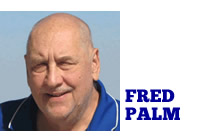 Flooding is a coastal threat. Comprehensive plan funding is needed by all the S.C. state coastal counties and cities; and where the lion’s share of state revenue is drawn. We urgently need the state to act by funding a statewide plan including the coastal waters’ edges and upland rivers. Protect your funding sources and yes, its people — rich and poor — as we are all at risk. High water only knows geography, not your current economic status.
Flooding is a coastal threat. Comprehensive plan funding is needed by all the S.C. state coastal counties and cities; and where the lion’s share of state revenue is drawn. We urgently need the state to act by funding a statewide plan including the coastal waters’ edges and upland rivers. Protect your funding sources and yes, its people — rich and poor — as we are all at risk. High water only knows geography, not your current economic status.
Locally, a subordinate, comprehensive flood mitigation and control plan for Berkeley, Charleston and Dorchester counties does not exist to identify the supposed natural ways, going beyond planting trees, to address how we protect ourselves. The BCD Council of Governments has no flood plans to offer its residents. It has transit plans that do not get implemented. They are planners. but not doers, who need to rally all the governments and approval holders to serve and act for the common good. One common good is to stay dry by getting out of harm’s way of flooding.
BCDCOG fulfills the legislative mandate mission as to assist local governments in planning for common needs, cooperating for mutual benefit and coordinating for sound regional development. Come up with a real regional flood control plan that puts every square foot of parks, marshes, swamps, floodplains, historical rice fields and plantation lands at the barricades, as part of robust flood defense that will actually work across all the land, not just those with means buy higher land and flood insurance. Step on some toes if you have to get a good workable plan that protects us all.
All city of Charleston residents need to move quickly — beyond planting trees — to come up with a full-scale, integrated flood control plan that this writer is nudging the elected officials of the city to think about. The going part-of-the -way advocacy reveals that P&C boosterism is part of the problem. So instead of blasting you for your failures and irresponsibility for failing to act as swiftly as the waters will come upon us in the night, you are cajoled to take a token step of planting trees of unspecified caliber, as if you are doing something. P&C writers need to talk constructively talking about the dilemma of a $2 billion drainage plan that is now all talk and advocate more features beyond increasing the tree canopy. Talking is not action. In between is needed the very best flood control plan designed to work as promised — control flooding.
Take the $2 billion dollars for pipes and pumps and divide it by the number of households, residents, workers, visitors and obviously the build-out will not occur soon enough. However, the just-talk strategy of flood control will continue; until the time comes to abandon ship — as it is then too late. Mayor Tecklenburg talks about looking for funds to address the dilemma. So is every coastal community. Flood protection is expensive. Consider New Orleans, Miami and New York which have expressed genuine flood control plans designed to contain real water, not concept water. Show us the financing plan that is going to build out the drainage plan — before the waters come.
Charleston County planners will be rewriting the county’s 10 year comprehensive plan this year. Do you think that since the county surrounds the city of Charleston the flood plans should be linked and comprehensive? Do you think a county comprehensive plan should protect the entire county for the next 10 years as it will be used for to justify its decision-making of what and where permission to build is given? Do you think more residents should be placed near the water’s edge so they can be flooded out, only to be rebuilt or bought out with our tax dollars – that we now need instead to keep all of us dry?
Right now, all we have The Potemkin Village Comprehensive Flood Mitigation and Control Plan Title Page. We need to do much more, quickly.
- Have a comment? Send to: editor@charlestoncurrents.com
BRACK: Engaging in community discussions may help us move forward
By Andy Brack, editor and publisher | Most people don’t have the time or inclination to attend lots of public meetings where elected officials make decisions that impact their lives. Most people have got better things to do, including not being bored (much of the time) out of their skulls in meeting rooms.
 But every community has faces familiar to elected officials. These are the squeaky wheels, the people who show up and make their cases, time after time. And more often than you’d think, they get the grease in the public policy process because they advocate for their positions. But just because these folks are squeaking doesn’t mean that what they want is what most people want.
But every community has faces familiar to elected officials. These are the squeaky wheels, the people who show up and make their cases, time after time. And more often than you’d think, they get the grease in the public policy process because they advocate for their positions. But just because these folks are squeaking doesn’t mean that what they want is what most people want.
A new foundation in the Lowcountry is working on a way to give voices to the voiceless – to engage more people so they can share what’s good and what’s challenging in their neighborhoods and communities. Think of their project as a community-wide focus group that seeks to find out what’s really on people’s minds.
The Library Foundation of the Lowcountry tested the project, dubbed “Lowcountry On the Table,” to see what would happen if varied small groups of people sat together for an hour or so to just talk about life. Across Charleston, Berkeley and Dorchester counties on Tuesday, more than 60 groups of six to 10 people gathered for a meal or refreshments in homes, libraries, businesses, Rotary clubs and other places to explore what unified them and what was keeping people apart.
What resulted was phenomenal. Strangers shared. Acquaintances became a little closer. Neighbors engaged.
Initial results show virtually all attendees were satisfied with the quality of these unstructured conversations. Three in four committed to taking more action to improve their communities. And seven in eight met someone they didn’t know.
The table discussions, arranged independently by volunteer hosts, engaged diverse groups that looked like the area as a whole. Some 28 percent of participants were African American, 14 percent were Hispanic and 6 percent were teenagers. They were distributed in urban, suburban and rural settings.
Topics ranges from education, traffic and flooding to growth, affordable housing and more. Here are some of the comments from two sessions:
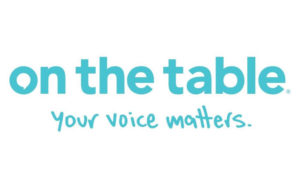 Traffic: “When I hear the conversation about traffic, they never ask why you were in the car. It’s almost the presumptive car culture. Part of the solution could be better retail services and opportunities in their neighborhoods” so people don’t have to drive so much and clog up the roads. In another group, a guest similarly observed, “When you can start taking away the reliance on cars, you can start creating dynamism in neighborhoods … by not relying on cars.”
Traffic: “When I hear the conversation about traffic, they never ask why you were in the car. It’s almost the presumptive car culture. Part of the solution could be better retail services and opportunities in their neighborhoods” so people don’t have to drive so much and clog up the roads. In another group, a guest similarly observed, “When you can start taking away the reliance on cars, you can start creating dynamism in neighborhoods … by not relying on cars.”
Education: “We need more autonomy in neighborhood schools … so they are running themselves,” one man said. Another added, “There is a segment of schools not performing to the standards we expect.” Others added that schools needed to focus more on improving diversity, reducing re-segregation, , focusing on skills and improving leadership.
Housing: “We’re running a segment of the population off of the peninsula” because of the lack of affordable housing.
But what was really interesting in these sessions was how positive participants were about their communities.
“The people are friendly,” one elderly man said. “It’s amazing how helpful people can be.”
Another added, “Seeing the way people come together here is a gift. If you go to Anywhere USA, you don’t have people who have a habit of gathering together.” Another person who loved living in Charleston weighed in, “Things are getting done. … Even when it is bad, how bad is it really?”
All communities have challenges and opportunities. What Lowcountry On The Table, which will broaden to hundreds of tables in the fall after this successful pilot, showed was how vital it is for people to connect more and have conversations that can lead to better places to live.
Bottom line: We need to engage in our neighborhoods to talk more about things that we might not be comfortable with and talk with people with whom we might not normally talk. More than likely, we’ll learn a lot – and be surprised at how much we have in common.
- Have a comment? Send to: editor@charlestoncurrents.com
SPOTLIGHT: Titan Termite & Pest Control
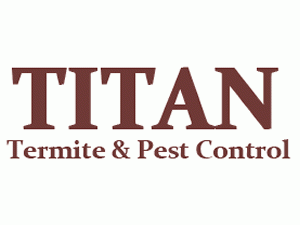 Titan Termite & Pest Control, headquartered in Charleston, is a full service residential, commercial and industrial pest control company serving South Carolina. It is a third-generation, family-owned company known for outstanding customer service. Each associate is dedicated to the customer and exhibits integrity and respect. Titan’s pest professionals can assist your commercial or residential location with general pest control, termite inspections, termite control, flea control, bed bug extermination, ant control and more. Titan Termite and Pest Control continues to set high standards so that its customers receive the best possible service. Titan’s technicians are knowledgeable of the latest in pest control techniques, which enables the company to customize effective treatment plans for every situation.
Titan Termite & Pest Control, headquartered in Charleston, is a full service residential, commercial and industrial pest control company serving South Carolina. It is a third-generation, family-owned company known for outstanding customer service. Each associate is dedicated to the customer and exhibits integrity and respect. Titan’s pest professionals can assist your commercial or residential location with general pest control, termite inspections, termite control, flea control, bed bug extermination, ant control and more. Titan Termite and Pest Control continues to set high standards so that its customers receive the best possible service. Titan’s technicians are knowledgeable of the latest in pest control techniques, which enables the company to customize effective treatment plans for every situation.
- Free estimate: 888-794-5603.
- Contact Titan online.
WHAT WE LOVE: Tell us what you live about the Lowcountry
![]() Tell us what you love. Send a short comment – 50 words to 100 words – that describes something you really enjoy about the Lowcountry. It can be big or small. It can be a place, a thing or something you see. It might the bakery where you get a morning croissant or a business or government entity doing a good job. We’ll highlight your entry in a coming issue of Charleston Currents. We look forward to hearing from you.
Tell us what you love. Send a short comment – 50 words to 100 words – that describes something you really enjoy about the Lowcountry. It can be big or small. It can be a place, a thing or something you see. It might the bakery where you get a morning croissant or a business or government entity doing a good job. We’ll highlight your entry in a coming issue of Charleston Currents. We look forward to hearing from you.
GOOD NEWS: Charleston Forum offers list of June 21 speakers
Staff reports | The Charleston Forum, a community project that strives to provide a dialogue that moves the conversation forward with no pre-set agenda, has announced its full list of speakers for its 2018 two-hour discussion, which will start at 7:30 p.m. June 21 at the Charleston Music Hall. (More) Tickets are free.
![]() More than 900 people attended last year’s event. In June, the forum will focus on overcoming racial disparities in education and economics in two panel discussions. Speakers will include:
More than 900 people attended last year’s event. In June, the forum will focus on overcoming racial disparities in education and economics in two panel discussions. Speakers will include:
- Cindy Ambrose, Deputy Superintendent of Learning Services, Charleston County School District
- Sue Berkowitz, Executive Director of S.C. Appleseed Legal Justice Center
- Paris Dennard, Senior Director of Strategic Communications, Thurgood Marshall College Fund
- Darrin Goss, President and CEO, Coastal Community Foundation
- Lilyn Hester, Southeast Public Affairs, Google
- Faith Rivers James, Assistant Provost for Leadership, The Citadel
- Michael B. Moore, CEO/President, International African American Museum
- John Read, CEO, Tri-County Cradle to Career
- Bakari Sellers, CNN Commentator and Attorney
- Alana Simmons, Former educator and creator of Hate Won’t Win, Granddaughter of Rev. Daniel L. Simmons Sr.
- Elliot Smalley, Superintendent, Public Charter School District
- Steve Warner, Vice President of Global Competitiveness, Charleston Regional Development Alliance.
In other Good News:
Food drive is Saturday. The Lowcountry Food Bank, National Association of Letter Carriers and Food Lion are sponsoring a community-wide food drive Saturday. Food Lion will provide bags that people can use to donate non-perishable goods next to their mail boxes on May 12. Letter carriers will collect the food and take it to the food bank to sort and distribute. In 2017, the “Stamp Out Hunger” food drive collected 136,611 pounds of food for the tri-county area, which created 114,000 meals for food insecure children, seniors and families, according to a press release.
New partnership. Nashville-based concert promotion company, National Shows 2 (NS2) has entered into a category exclusive booking agreement with the Charleston Gaillard Center for all bookings except classical, dance, Broadway, and educational programing. This new partnership will strengthen the Gaillard Center’s event offerings and diversify the Gaillard Center’s calendar. Recently renovated in 2015, the 1,800-seat Martha and John M. Rivers Performance Hall has presented events such as Lewis Black, Tony Bennett, and ZZ Top.
“This partnership with NS2 will only boost the Gaillard Center’s strong start in presenting contemporary and comedic talent. We are excited to be working with a high quality promoter in NS2.” said Stephen Bedard, Gaillard Center’s president and CEO.
Art prize deadline approaches. It’s the final month to apply for the Gibbes Museum of Art’s 1858 Prize for Contemporary Southern Art. Sponsored by the museum’s young patrons auxiliary group Society 1858, the prize is awarded annually to an artist whose work demonstrates the highest level of artistic achievement in any media, while contributing to a new understanding of art in the South. Entries for the annual award and $10,000 cash prize can be made exclusively online at 1858prize.org through May 31, 2018. Artists from Alabama, Arkansas, Florida, Georgia, Kentucky, Louisiana, Mississippi, North Carolina, South Carolina, Tennessee, Virginia and West Virginia are eligible to apply.
More travelers at airport. The number of people flying to and from Charleston rose more than 10 percent in March at Charleston International Airport. In March, 174,230 people boarded a flight at the airport, an 8.9 percent increase. The number of people arriving rose 12.3 percent to 184,477 passengers, according to a press release. “Spring is the start of high travel season in the Lowcountry and is typically when more people travel through the airport,” said airport Executive Director and CEO Paul G. Campbell. “Spring is also when our airlines expand their seasonal services, flying larger aircraft and increasing travel frequency to new destinations and existing cities.”
Rebranded. Lowcountry AIDS Services has rebranded as Palmetto Community Care to keep pace with the evolving HIV and AIDS epidemic. According to the organization, “ewer people are progressing from HIV to an AIDS diagnosis. To keep pace with those changes and better reflect the current state of the epidemic Lowcountry AIDS Services decided it was time to rebrand.” Visit the new website.
- Have a comment? Send to: editor@charlestoncurrents.com
FEEDBACK: Ready, Get Set, Vote
To the editor:
![]() Voters in our communities will soon be casting votes in the South Carolina Primary Election. Eligible citizens have until May 13 to register so they can vote in the June 12th Primaries and June 26th Primary Runoffs (runoff if needed).
Voters in our communities will soon be casting votes in the South Carolina Primary Election. Eligible citizens have until May 13 to register so they can vote in the June 12th Primaries and June 26th Primary Runoffs (runoff if needed).
Now is also the time to familiarize ourselves with the candidates on the ballot and the offices up for grabs. This year they include governor and all state constitutional offices, all U.S. and S.C. House of Representatives seats, and numerous other offices, such as county council, probate judge and register of deeds. Whether you are a college student or senior citizen, a secretary or CEO, Election Day is every voter’s opportunity to weigh in on the issues that matter most to you.
Candidates selected by state primary voters in June will appear on our November 6 ballots, along with candidates running for nonpartisan offices, such as municipal councils and school boards for all local districts.
As voters, we need to decide who will do the best job for us right here in our communities. Whether we are concerned about public health and education, what jobs are available, the cost of higher education, our children’s safety or national security, few of us will have the opportunity to personally ask each candidate what their plans are for addressing our community’s needs. So, where do we go to find these answers?
For help, head to www.VOTE411.org where voters can access their voters’ guide and candidate and ballot information. The League of Women Voters’ nationwide voter education resource, VOTE411.org was created to provide you with your personalized voting guide that includes up-to-date information you need to cast your ballot, including who’s on your ballot, information about voting absentee and what types of identification you will need.
At VOTE411, you can also register to vote, make sure your registration is active and update your registration, if necessary.
These last weeks before Election Day are an important time for all voters to take advantage of every available opportunity we have to learn about the candidates. Voting is the one time when we all have an equal say in standing up for the issues and priorities that matter most to us and our community.
Vote! Our jobs, health, education, families and futures depend on it.
— Barbara Zia and Joan Zaleski, directors, Citizen Education and Voters Service, League of Women Voters of the Charleston Area
Send us your thoughts . We love hearing from readers. Comments are limited to 250 words or less. Please include your name and contact information. Send your letters to: editor@charlestoncurrents.com| Our feedback policy.
MYSTERY PHOTOMYSTERY: Extreme close-up
This is a close-up photo of a place in Charleston that readers should frequently see. Where is it? Send your guess to editor@charlestoncurrents.com with “Mystery Photo” in the subject line. Please make sure to include your name and contact information.
Last issue’s mystery
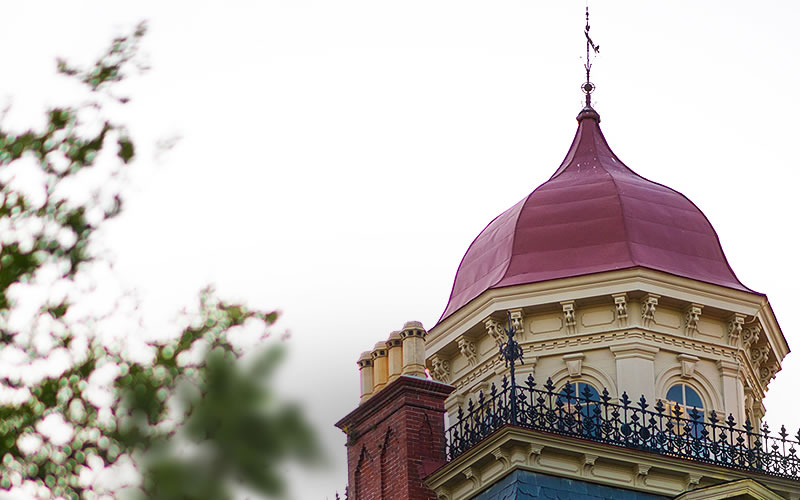 In the April 30 Mystery Photo, we showcased the top of a building and asked where it is. Answer: Wentworth Mansion in Charleston, a top-quality, luxury hotel on, well, Wentworth street.
In the April 30 Mystery Photo, we showcased the top of a building and asked where it is. Answer: Wentworth Mansion in Charleston, a top-quality, luxury hotel on, well, Wentworth street.
Hats off to readers who figured out the mystery: George Graf of Palmyra, Va.; Tom Tindall of Edisto Island; Archie Burkel of James Island; Chalmers Mikell of Columbia; Chris Brooks of Mount Pleasant; Scott Watson of Charleston; Deborah Getter of Johns Island; and Bridget Price of the Charleston area.
Graf said he had to do some digging to find the building, which “was ranked in 2018 as the #2 Luxury Hotel in the United States by TripAdvisor Traveler’s Choice Award and was on the Conde Nast Gold List for 2018.
“According to charleston.com, built at a time when money was scarce in the south, Francis Silas Rodgers gave Charleston one of its grandest homes.
“Rodgers was born in Charleston in 1842 and went into the cotton factoring business with his father. A factor was simply a broker or middleman; most cotton planters used cotton factors located in major ports like Charleston to sell their exports. Even after the Civil War, sea island cotton was a viable export in the South until the early part of the twentieth century when the boll weevil came along.
“Rodgers was able to weather most of the economic problems facing the South after the Civil War. Though Charleston and the surrounding area was economically devastated, some Lowcountry land owners, such as the Draytons, fortunately were able to find phosphate on their property. Rodgers invested in phosphate and owned a large interest in the Atlantic Phosphate Company. He also invested in other business enterprises and built his wealth over a period of years.
“Rodgers was active in local politics, serving on the City Council for two terms. For a city that endured five great fires between 1740 and 1861, one of Rodgers’ most important contributions was the organization of Charleston’s first paid professional fire department. Rodgers spent many hours using the cupola at 149 Wentworth as a watchtower for fires.”
Send us a mystery: If you have a photo that you believe will stump readers, send it along (but make sure to tell us what it is because it may stump us too!) Send it along to editor@charlestoncurrents.com.
S.C. ENCYCLOPEDIAHISTORY: Mules
S.C. Encyclopedia | A mule is a hybrid animal that results from breeding a male donkey with a female horse. Although mules have gender (males are called “horse mules” and females “mare mules”), they are sterile and cannot reproduce. For centuries mules have been prized for their intelligence and capacity for work. Farmers typically preferred mules to horses because mules usually lived longer, learned faster, and were better tempered than horses.
Mules were fixtures of rural life in South Carolina for two hundred years. Cotton and tobacco growers alike used mules, and the hearty animals plowed, harrowed, and hauled crops to market in every county in the state. The timber, naval stores, and phosphate industries employed mules as well. Among rural folk, ownership of mules placed landless farmers in a position to negotiate more favorable tenancy arrangements with landlords. An active market in mules existed throughout the year, and any serviceable mule was worth hard cash. Thus, mules were commonly pledged as collateral against loans and advances from banks and merchants.
South Carolina’s mule population peaked in the 1920s at around 210,000. As nearly all were imported from Missouri or Texas, the mule trade drained millions of dollars annually from South Carolina farmers. The state’s commissioner of agriculture prudently encouraged farmers to raise their own mules, but few heeded his advice.
By the 1940s tractors and trucks were replacing mules on South Carolina farms. The pace of change quickened after World War II, and by the early 1950s mules were the exception rather than the rule. Here and there a beloved animal lived out his days in semi-retirement tilling a vegetable garden as plowmen relied more and more on diesel power.
— Excerpted from an entry by Becky Walton. To read more about this or 2,000 other entries about South Carolina, check out The South Carolina Encyclopedia, published in 2006 by USC Press. (Information used by permission.)
ON THE CALENDARCALENDAR, May 7+: Greek Fest, Mother’s Day and more
![]() Charleston Greek Festival: May 11 to May 13, Greek Orthodox Church, 30 Race St., Charleston. You can enjoy Greek food, dancing and culture at this 48th annual event said to be the city’s third largest festival. To learn more and find out about parking and directions, click here.
Charleston Greek Festival: May 11 to May 13, Greek Orthodox Church, 30 Race St., Charleston. You can enjoy Greek food, dancing and culture at this 48th annual event said to be the city’s third largest festival. To learn more and find out about parking and directions, click here.
(NEW) Mother’s Day at Magnolia: 11 a.m. to 3 p.m. May 13, Magnolia Plantation and Gardens. You can celebrate Mother’s Day and be serenaded over a pre-ordered picnic lunch at the attraction. There will be a solo guitarist for the first two hours in the Conservatory, followed by a string duet. Pre-order lunch ($13) by phoning 843.771.1266, ext. 225, by May 9. Click here to see menu.
A Frank discussion: Noon, May 15, Halls Signature Events, 5 Faber St., Charleston. Nationally-known and local author Dorothea Benton Frank will launch her new book, By Invitation Only, at a special talk and lunch as part of the Blue Bicycle Books author series. Doors open at 11:30 a.m. Cost is $62, which includes lunch and a signed book. More.
Free skin check. Dermatologists and certified dermatological providers from Dermatology and Laser Center of Charleston will offer free skin cancer screenings for new patients on May 15. The screening will take place at the offices of Dermatology and Laser Center of Charleston 5 p.m. to 7:30 p.m. May 15 at 1364 Ashley River Road, West Ashley. Registration for the event is required and may be made by phoning 843-556-8886, visiting their website www.dermandlaser.com.
Camp for young asthma sufferers: 10:30 a.m. to 2:30 p.m., May 19, Mary Ford Elementary School, 3180 Thomasina McPherson Blvd., North Charleston. Camp Breathe Easy is a one-day camp for children ages 6 to 13 who have been diagnosed with asthma. Parents are welcome too. It’s free, but registration is required. To apply, call the American Lung Association at 843.556.8451 or visit this website.
Early morning bird walks at Caw Caw: 8:30 a.m. every Wednesday and Saturday, Caw Caw Interpretive Center, Ravenel. You can learn about habitats and birds, butterflies and other organisms in this two-hour session. Registration not required, but participants are to be 15 and up. $10 per person or free to Gold Pass holders. More: http://www.CharlestonCountyParks.com.
AREA FARMERS MARKETS
SATURDAYS: The Charleston Farmers Market, is back in action from 8 a.m. to 2 p.m. every Saturday through Nov. 24 at Marion Square. A holiday market will be open Dec. 1, 2, 8. 9, 15 and 16.
SATURDAYS: Johns Island Farmers Market operates each Saturday from 10 a.m. to 1 p.m. year-round with more than 50 local farmers and vendors, food trucks, music and more. The market is located on the campus of Charleston Collegiate School, 2024 Academy Road, Johns Island.
SATURDAYS: The Town Market on James Island are again open. Open 9 a.m. to 1 p.m. every Saturday at the James Island Youth Soccer Club, 871 Fort Johnson Road, James Island.
TUESDAYS: The Town of Mount Pleasant’s Farmers Market is every Tuesday from 3:30 p.m. to 7 p.m. in the market pavilion at Moultrie Middle School, 645 Coleman Blvd, in Mount Pleasant.
WEDNESDAYS. The West Ashley Farmers Market, 55 Sycamore Ave., is open every Wednesday from 3 p.m. to 7 p.m. in Ackerman Park. More.
- If you have an event to list on our calendar, please send it to editor@charlestoncurrents.com for consideration. The calendar is updated weekly on Mondays.
OUR UNDERWRITERS
Charleston Currents is an underwriter-supported weekly online journal of good news about the Charleston area and Lowcountry of South Carolina.
- Meet our underwriters
- To learn more about how your organization or business can benefit, click here to contact us. Or give us a holler on the phone at: 843.670.3996.
OUR TEAM
Charleston Currents offers insightful community comment and good news on events each week. It cuts through the information clutter to offer the best of what’s happening locally.
- Mailing address: O. Box. 22261 | Charleston, SC 29413
- Phone: 670.3996
Charleston Currents is provided to you weekly by:
- Editor and publisher: Andy Brack, 843.670.3996
- Contributing photographer: Michael Kaynard
- Contributing editor, careers: Ben Fanning
- Contributing editor, common good, Fred Palm
- Contributing editor, money: Kyra Morris
- Contributing editor, Palmetto Poem: Marjory Wentworth
SUBSCRIBE FOR FREE
Subscriptions to Charleston Currents are free.
- Click here to subscribe.
- We don’t want to lose you as a reader of Charleston Currents, go to the bottom of any of your weekly newsletters and click the “unsubscribe” function. If that doesn’t work, please send us an email with the word “unsubscribe” in the subject line.
© 2008-2018, Statehouse Report, LLC. All rights reserved. Charleston Currents is published every Monday by Statehouse Report LLC, PO Box 22261, Charleston, SC 29413.


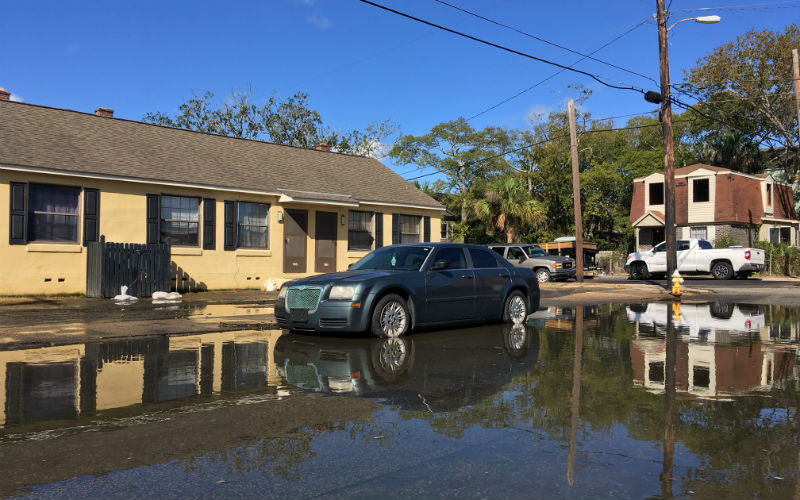

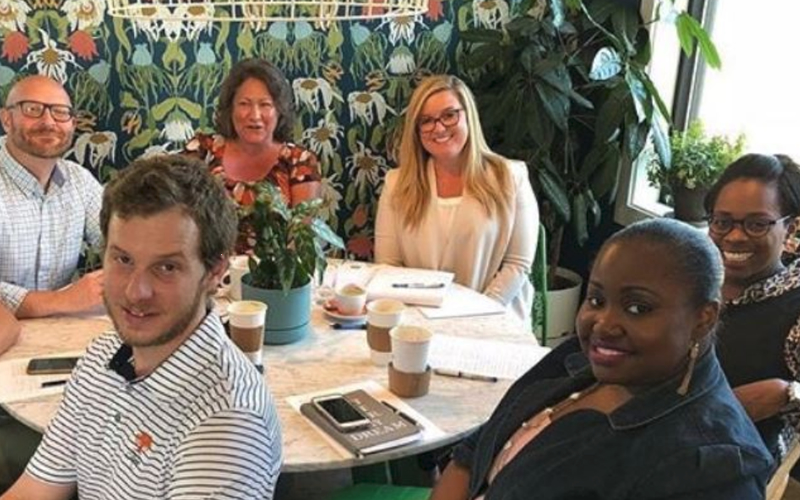
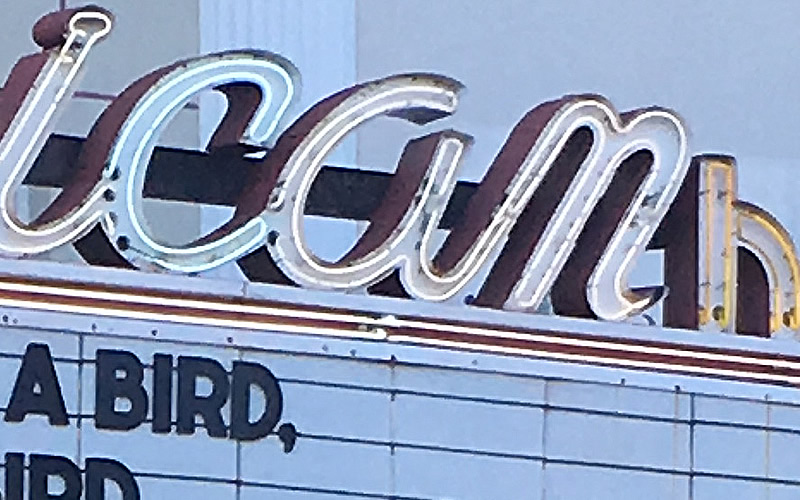
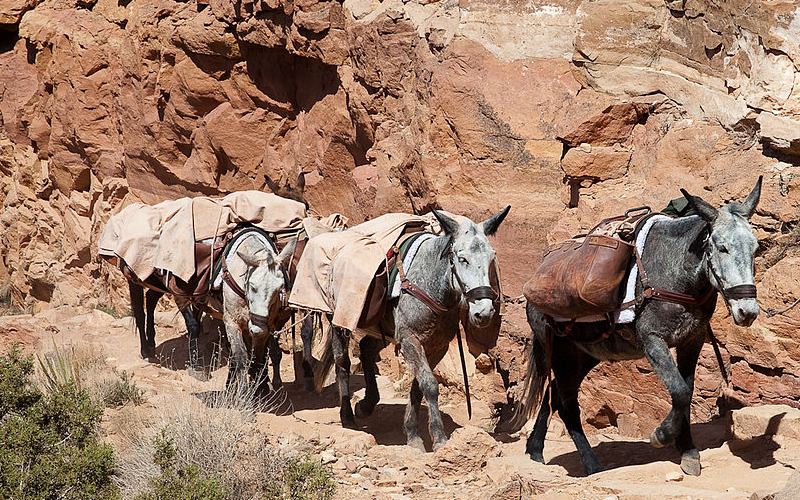

 We Can Do Better, South Carolina!
We Can Do Better, South Carolina!
























